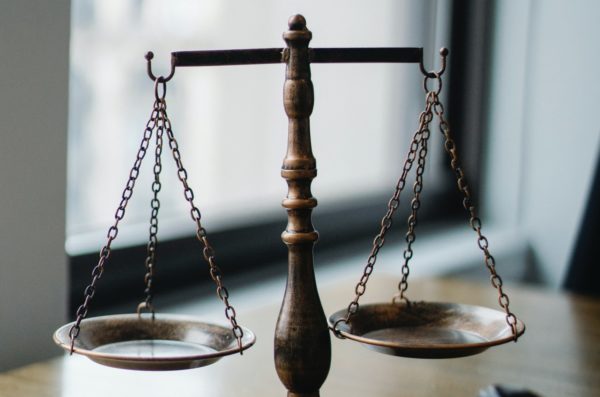Washington Supreme Court Justices Unanimously Expand Efforts to Protect Black People Against Racism In Civil Cases
Taking steps toward removing racism from the state court system, the Washington Supreme Court has issued a historic ruling that, in civil cases where racial bias is a factor, the one true fix should be a new trial. Misconduct of a “race-based” nature, the court finds, can “never be a harmless error.”
Judgement scale and gavel in judge office Credit: Pexels.com
The ruling was unanimously passed on Thursday, Oct. 20, and states in cases where someone’s civil rights were allegedly violated and a losing party claims their defeat was because of racial prejudice or bias, the court must undergo another hearing to determine if their suspicion has merit.
This effort further expands the Evergreen State’s efforts to protect marginalized citizens’ human rights, according to The Seattle Times.
“This court has stated, unequivocally, that we owe a duty to increase access to justice, reduce and eradicate racism and prejudice, and continued to develop our legal system intone that serves the ends of justice,” the court wrote.
“Recognizing that a verdict affected by racism violates fundamental concepts of fairness and equal justice under law, we recently held in a criminal case that race-based prosecutorial misconduct can never be ‘harmless effort.’”
Furthermore, the justices stated as justification for their ruling, “If racial bias is a factor in the decision of a judge or jury, that decision does not achieve substantial justice, and it must be reversed.”
This radical effort finds its roots in a personal injury case involving Janelle Henderson, who is Black, who asserts her Tourette’s Syndrome was exacerbated when she was in a car collision where her car was hit by Alicia Thompson, who is white in 2014, KIRO News Radio reports.
The case first went to trial in 2017. At the time, Henderson and her attorney, Vonda Sargent, asked the court to award them $3.5 million in damages for the injuries caused by the accident. Thompson, who admitted fault, refused to compensate the victim.
The judge was a white woman and not one of the jurors was Black. The only Black people in the courtroom were the plaintiff, her legal representation, and their witnesses.
While having no racial diversity in the court was troublesome, Henderson and Sargent said during the civil trial, the defense painted a picture of the victim with strokes of racialized stereotypes about Black women.
The plaintiff was described as “combative” and “confrontational” during the trial, which are two dog whistles denoting Black women are difficult by nature, her legal team asserts.
The defense also used the testimony of her friends to paint her as the “life of the party,” floating the idea she was a party animal. Henderson’s lawyers also claimed that was more coded language that insinuated something about her client’s nature and linked her back to a stereotypical trope.
In the end, after hearing Henderson framed with these words and despite her life-changing injuries, her original claim was denied by a jury and she was only awarded $9,200.
Sargent took this case to the Supreme Court and the justices sided with Henderson.
Particularly since when she objected to the language being used, the court stated, “it could not ‘require attorneys to refrain from using language that is tied to the evidence in the case, even if in some contexts the language has racial overtones.’”
The justices wrote, “That reasoning gets it exactly backward.”
According to the court, the jury heard racial bias when Thompson’s lawyers asked about her choice to use her employer as the expert physician to give testimony about her condition, and when the defense said she was “exaggerating to acquire an unearned financial windfall.”
In a 33-page opinion, which was written by Justice Raquel Montoya-Lewis, the court said an “objective observer” must be called after a civil case is completed to determine if racial bias found its way into the verdict.
“A trial court must hold a hearing on a new trial motion when the proponent makes prima facie showing that this objective observer could view race as a factor in the verdict, regardless of whether intentional misconduct has been shown or the court believes there is another explanation,” the opinion stated.
“At that hearing, the party seeking to preserve the verdict bears the burden to prove that race was not a factor. If that burden is not met, the court must conclude that substantial justice has not been done and order a new trial.”
Montoya-Lewis also stated in the opinion Henderson and her lawyer Vonda Sargent, who is also Black, were both objectified by the statements made by the defense that undermined the personage of their witnesses and their case with coded language and overt racial stereotypes.
Justice Gordon McCloud wrote a separate opinion objecting to the way the majority characterized some of the defense’s statements.
2022 has seen a lot of attention on racialized bias in Washington State courts. The same justices said in June “race-based” misconduct can “never be a harmless error” in a criminal case, “recognizing that a verdict affected by racism violates fundamental concepts of fairness and equal justice under the law.”
“Today, we emphasize that while the legal framework differs in the civil context, the same principle applies in civil matters,” Montoya-Lewis wrote. “Racism is endemic, and its harms are not confined to any place, matter, or issue.”
Another explosive revelation was the misconduct of Superior Court Judge Melinda Young, who the justices stated abused her discretion and power when she failed to punish the defense for withholding evidence from Henderson’s lawyers before the trial happened.
“Here, the trial court abused its discretion by failing to grant an evidentiary hearing and also by failing to impose any sanctions for Thompson’s discovery violations,” the justices stated. “We reverse and remand for further proceedings consistent with the framework we announce today.”
The new trial between Henderson and Thompson has yet to be set.

